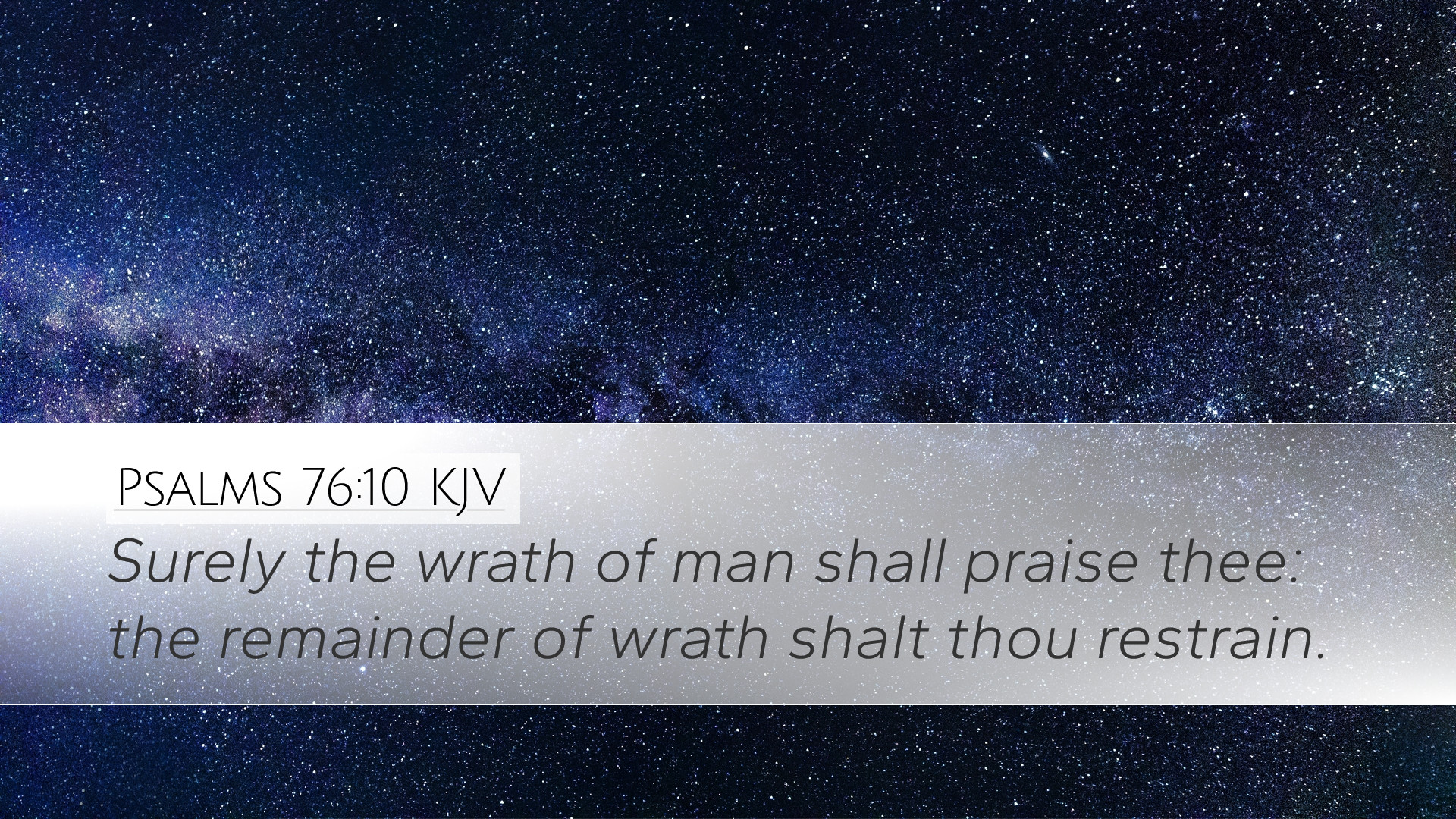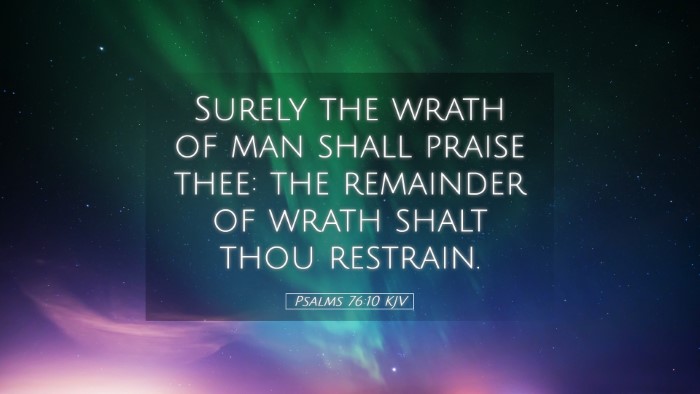Commentary on Psalms 76:10
Verse: "Surely the wrath of man shall praise thee: the remainder of wrath shalt thou restrain."
Introduction
This verse from Psalm 76 encapsulates profound theological reflections regarding God's sovereignty and the purpose of human actions, especially in the context of divine justice. The insights from esteemed public domain commentators, such as Matthew Henry, Albert Barnes, and Adam Clarke, converge to reveal the multi-faceted implications of this verse for spiritual leaders, scholars, and the faithful.
The Wrath of Man
Matthew Henry articulates that the "wrath of man" serves a unique purpose within the divine plan. While human anger typically evokes sin and chaos, God can use even the most unruly expressions of human emotion to declare His glory and power. Henry notes that God's ability to derive praise from human wrath reflects His sovereign authority to turn negativity into a source of worship and honor.
Albert Barnes further emphasizes that human dispositions, even in their most negative forms, are subject to God's overarching will. He asserts that the phrase encapsulates the notion that, regardless of the seemingly evil intentions behind human anger, God can orchestrate events for His ultimate good. This management of human wrath serves to highlight God's redemptive capabilities.
Divine Restraint
The latter part of the verse, "the remainder of wrath shalt thou restrain," speaks to God's providential control over the extent of human hostility. Adam Clarke expounds on this concept by elucidating that while God permits human wrath to exist, He artfully restricts its effects to prevent complete devastation. This divine restraint is a testament to God's mercy and grace, indicating that He provides a boundary to the consequences of sin.
Matthew Henry also suggests that God holds back the full expression of human wrath to prevent utter chaos and disaster. This concept is critical for understanding God's nature — He is not only just but also merciful, willing to restrain righteous anger for the sake of His creation. The balance between justice and mercy is where theological reflection can spark deep understanding among scholars and students of the Word.
Theological Implications
God’s Sovereignty
The overarching theme of this verse relates to God’s sovereignty over all creation, including human emotions and actions. Albert Barnes notes that the acknowledgment of God’s ability to utilize sinful behavior for His praise underscores His ultimate authority. This understanding encourages pastors and theologians to maintain hope and confidence in God’s sovereignty, even amid difficulties imposed by sinful human nature.
The Purpose of Wrath
Henry emphasizes that God’s transformative work can channel human anger toward righteousness. It invites reflection on how believers respond to wrath in their lives, seeking to glorify God even in discord. For pastors, this notion underscores the need for pastoral care that recognizes the power of God to redeem and transform lives, even those marred by human wrath.
Praise in Difficult Times
This verse serves as a reminder for believers that God's purposes can be realized even in tumultuous times. Adam Clarke remarks that the ability to praise God amid trials strengthens the believer's faith. The recognition that God can be glorified through hardship equips students and scholars with a framework to discuss suffering and worship holistically.
Practical Applications
- Encouragement for Pastors: Pastors can draw from this verse to encourage congregations during times of strife, reminding them that God uses even their struggles for His glory.
- Teaching on Suffering: The insights gathered from these commentaries can form the basis of sermons or teachings on the role of suffering and the divine capability in transforming angst into praise.
- Discussion in Academic Circles: The complex relationship between divine sovereignty and human free will posed by this verse presents opportunities for rigorous academic discussions and explorations in theological studies.
- Personal Reflection: Individuals can meditate on their own responses to situations that evoke anger, seeking to align their reactions with God's will and purpose.
Conclusion
Psalms 76:10 serves as a powerful reminder of God's ability to restrain and redeem human wrath for His praise. Through the insights of Henry, Barnes, and Clarke, the complexities of this verse unfold, presenting a rich tapestry of theological truths that challenges and inspires believers. As scholars, pastors, and students reflect on this text, they are beckoned to acknowledge the profound ways God works through human experiences, transforming anger into a vehicle of worship.


